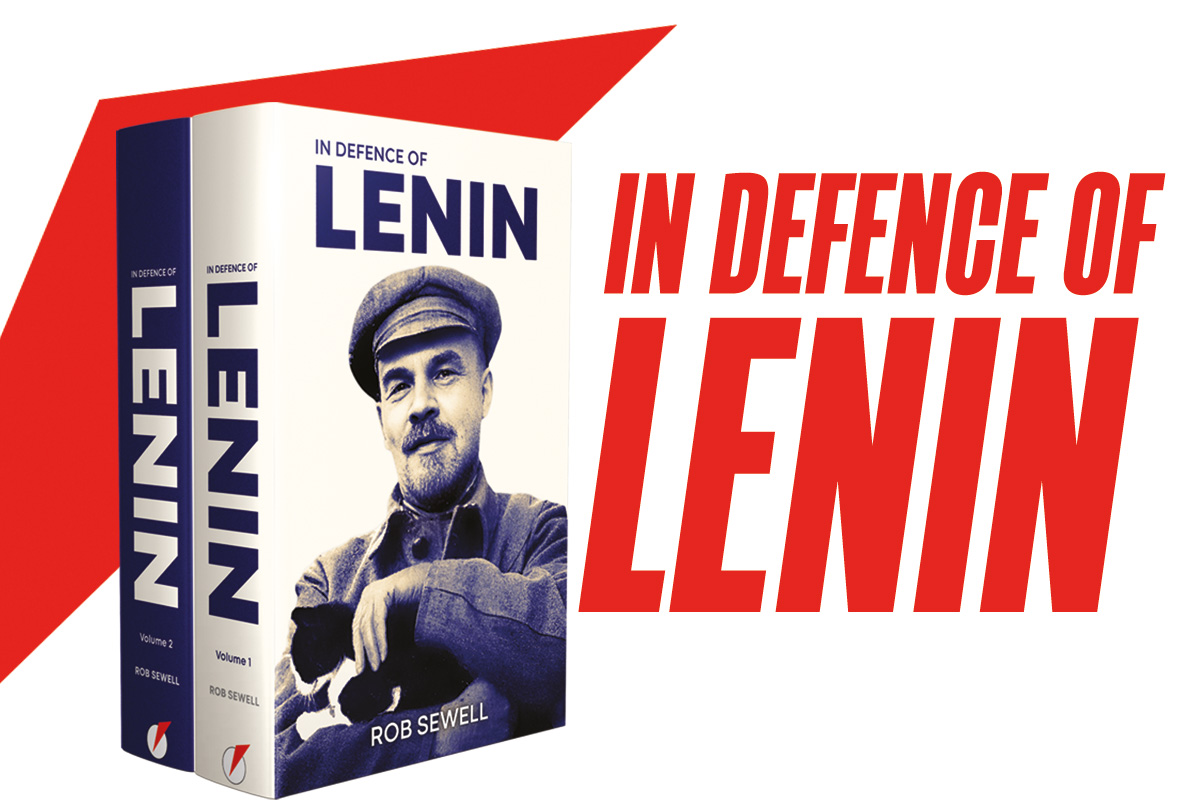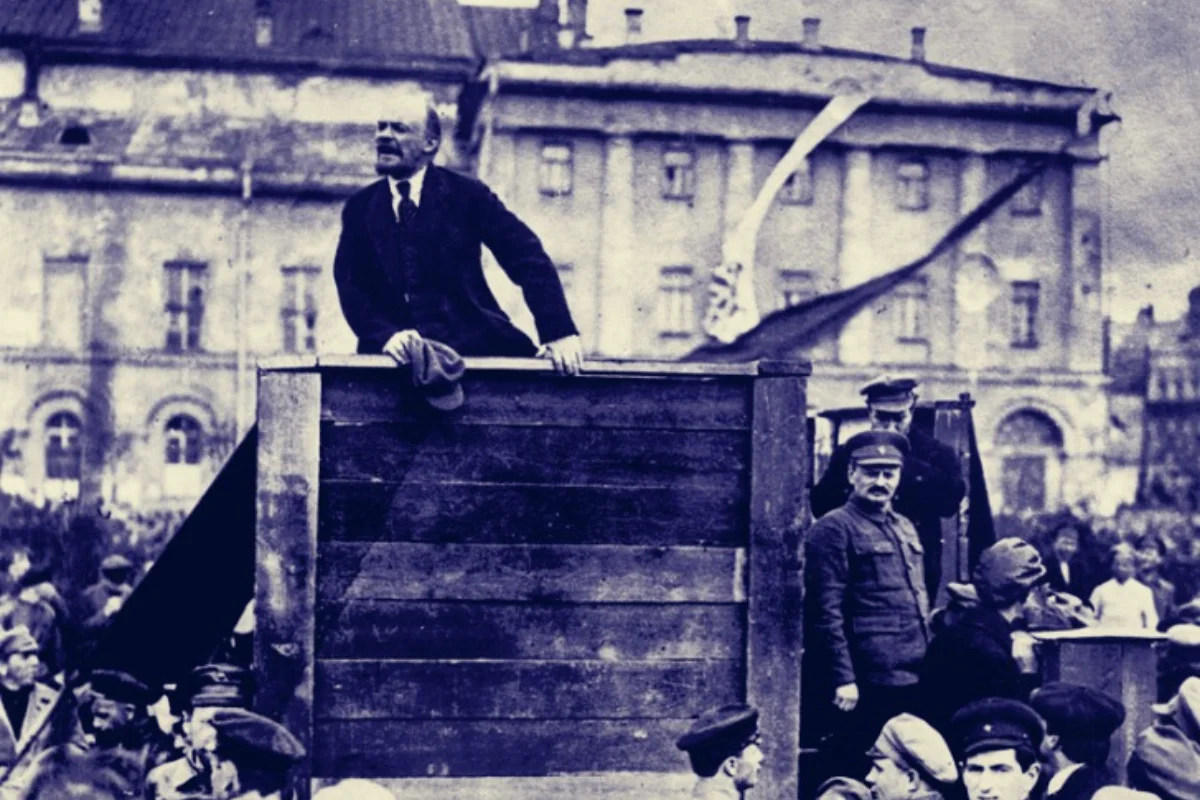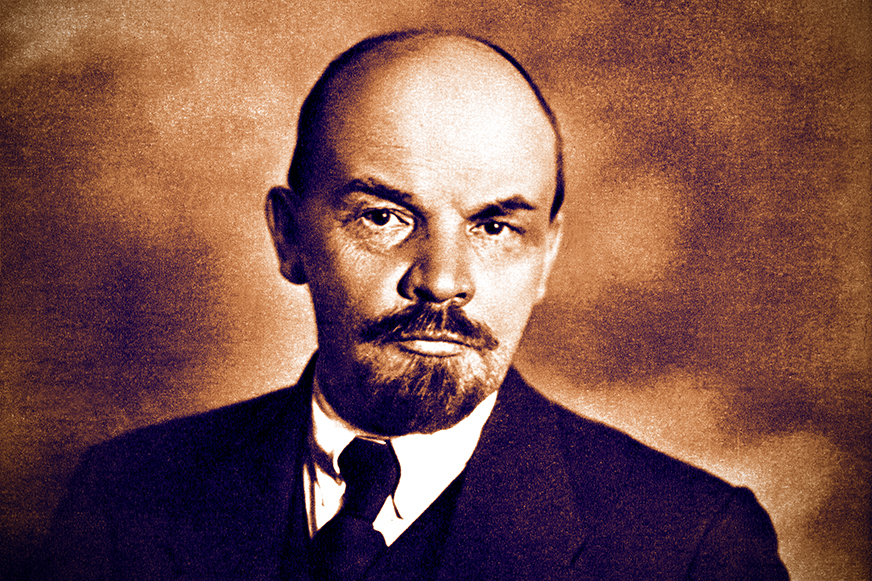
Experienced trade unionist John McInally introduces Wellred Books’ latest publication: a fascinating biography examining Lenin’s life and ideas by Rob Sewell and Alan Woods. With support for communism on the rise today, we say: Lenin lives!
[Originally published at communist.red]
“History will not forgive us if we do not assume power now.”
This was Lenin’s admonition to the vacillating Bolshevik central committee just prior to the Russian Revolution – the greatest event in world history, in which the working class took power.
These words encapsulate Lenin’s decisive role as a revolutionary, and as the founder of the Soviet Union. And they show why he remains the most vilified and feared figure for the capitalist exploiters he dedicated his life to overthrowing.
As expected, the recent centenary of his death has prompted an avalanche of hate, lies, and distortion from liberal politicians, Marxist renegades, and celebrity ‘historians’: that clique of desiccated academics and ruling-class courtiers whose defamations aim to maintain and justify the status quo.
Class-conscious workers should study Lenin’s life, work, and ideas, if for no other reason than to discover why their enemies try so hard to malign his legacy.
In Defence of Lenin by Rob Sewell and Alan Woods does exactly what it says: setting the record straight on Lenin’s life and work.
Over two sharply-paced and highly-readable volumes its analytical depth and focus, polemical in the best Marxist tradition, is gripping and accessible, particularly for new and young activists.
View this post on Instagram
Firm in principle
Born into a middle-class family, Vladimir Ilyich Ulyanov was deeply affected by the death of his brother Aleksandr, who was executed for his role in the attempted assassination of Tsar Alexander II.
But Lenin rejected the method of individual terrorism in favour of Marxism – a conclusion reached through hard study and through his participation in revolutionary struggle.

Recognising the working class as the motor force of revolution, he unswervingly committed to the Marxist concept of unified struggle – economic, political, and theoretical – as a prerequisite to challenging and defeating this system of exploitation and oppression.
His insistence that “without revolutionary theory there can be no revolutionary movement” is a fundamental truth to be learned by each generation and in every iteration of the class struggle.
Rejecting the “mythical spontaneity” of anarchism and ultra-leftism, he argued for a disciplined, centralised revolutionary party.
His accusers claim this method of organisation is evidence that Lenin was a cold-eyed fanatic with dictatorial tendencies. But they ignore his absolute insistence on the “corrective” necessity of party democracy, and his tremendous efforts to maintain unity in the Russian Social Democratic and Labour Party.
His method actually showed an extraordinary tolerance of opposing opinions. Debate provided clarity.
His critics’ hostility stemmed from Lenin’s refusal to compromise on matters of ideological principle. This could only lead to one outcome: capitulation to bourgeois pressures and ultimately to class betrayal.
Theory and practice
Lenin’s major works demonstrate an extraordinary dialectical unity of theory and practice. His most enduring writings were not abstract contemplations, but responses to the economic issues and political debates of the period.
Written during the First World War, his pamphlet Imperialism: The Highest Stage of Capitalism is essential reading for those grappling with current international events like the Ukraine war and the class nature of China.
Lenin explained that war is inevitable under the profit system, as a consequence of capitalism’s inherent dynamics. This analysis exposed the ‘goodies versus baddies’ lie that the elites deploy in order to pressure workers into sacrificing their lives for the sake of the capitalists’ power and profits.
This could not be more relevant today – not least in relation to the role of the labour and trade union leaders who then, as now, surrender to social chauvinism or pacifism.
Characteristically modest Lenin did not claim equality with Marx and Engels in his grasp of philosophy. But he knew of its critical importance.
His book Materialism and Empirio-criticism skewered the revisionist capitulation to subjective idealism of the time, a phenomenon that invariably arises in periods of reaction.
This same trend can be seen today, with self-appointed academic ‘improvers’ of Marxism and ‘revolutionary’ organisations embracing the degenerate, hyper-individualist claptrap of postmodernism.
Subjective factor
The role of the individual in history is often downplayed by those with no understanding of the living reality and forces that shape revolutionary events. In the case of Lenin, however, this subjective factor was critical. The Russian Revolution would have happened irrespective. But without him, it would not have succeeded.
In the tempest of revolution, Lenin did not just act. He studied, producing extraordinary material like State and Revolution – a razor-sharp analysis of the capitalist state and its “armed bodies of men”, the nature of dual power, and the art of insurrection.
A master tactician and strategist, Lenin scorned ultra-left adventurism. He knew when to retreat, as in the 1917 July Days of the ‘Great Slander’. But he also knew when to move decisively.
Those who describe the mainly bloodless October Revolution as a ‘coup’ consciously and conveniently ignore Lenin’s clear condition for the seizure of power: “The only way the [provisional capitalist] government can be overthrown is by winning a majority in the Soviets” – that is, by the Bolsheviks winning over the democratic organisations that constituted the living revolutionary authority of Russia’s toiling masses.
Rise of Stalinism
Following the October insurrection, the Soviet republic was attacked on all sides by the capitalist powers; subjected to a civil war in which seven million perished, mainly through starvation. Liberal ‘patriots’ slandered Lenin as a German spy, while themselves joining with the counter-revolution, choosing their side in the class war.
The young workers’ state prevailed, but at a terrible price. The working class was exhausted. Its best, most class-conscious and self-sacrificing forces were killed in defence of the revolution.

The economy was in ruins. Want was generalised, with workers struggling daily for survival – a far more pressing need than their participation in politics. This, along with still-high illiteracy rates, saw the entry, through practical necessity, of alien class tendencies as administrators and specialists in service of the workers’ state.
Using contemporary sources, this biography presents an extremely detailed account of Lenin’s struggle against the rise of bureaucracy in the new Soviet state.
At the same time, the authors explain how ideological and political differences arose as a consequence of the Soviet Union’s isolation and the defeat of revolutions elsewhere, most notably in Germany.
Bourgeois professors and politicians never tire of telling us that the monstrous distortions of Stalinism had their roots in Lenin’s approach and method. Such lazy malice is contradicted by the priority he gave to fighting the developing bureaucracy. In fact, it might be reasonably concluded that no issue concerned him more.
Lenin himself described the Soviet Union as a “workers’ state with bureaucratic distortions”. But he argued that “we can fight bureaucracy to the bitter end, to a complete victory, only when the population participates in the work of government”.
In defining the nature of the young Soviet state, and the need to defeat bureaucratism, his absolute commitment to workers’ democracy could not be clearer – not as some liberal sentiment, but as a necessity to avoid the elevation of the state over the class it was created to represent.
The chasm that exists between the ideas of Lenin and those of Stalinism, in this respect, could not be more clear.
Lenin lives!
The debate over the nature of the Soviet Union is not some abstract point of theory to be mulled over as an intellectual exercise. It is as critical a question today as when Lenin addressed the issue himself.
The collapse of the Soviet Union, with all its bureaucratic distortions, was a disaster for the working class internationally.
But it was also an opportunity to embark on a serious study of the forces – economic, political, and social – that created the conditions for the Stalinist bureaucracy to prevail. Only on this basis can we understand how capitalist restoration was possible.
Debating these issues in a comradely and honest manner is a prerequisite for any forces claiming to be Marxist; for anyone committed to defending Lenin’s genuine ideas and methods.
This book is an important assessment and analysis of Lenin’s life and work. It should be read by any communist or socialist activist serious about understanding the man, his times, and – most importantly – his ideas.
In Defence of Lenin is a vital weapon for arming workers and youth against our class enemies; against those who still dine out on the ‘defeat of communism’ and the collapse of the USSR – but who are now nervously looking over their shoulders with anxiety and fear in the realisation that Lenin’s ideas are overdue a return, and that his best days are yet to come.

